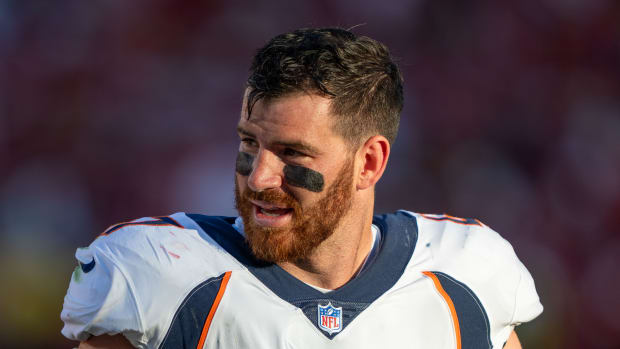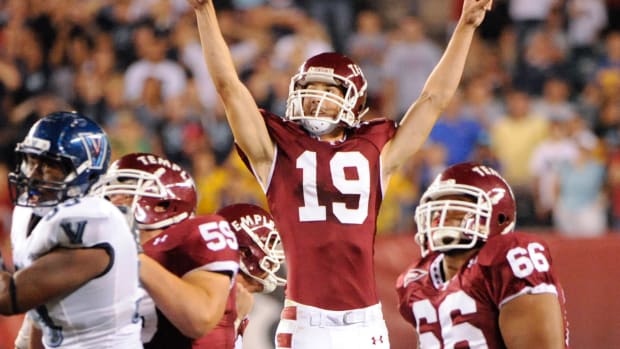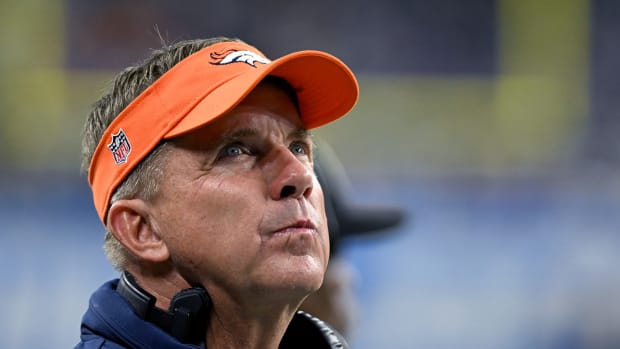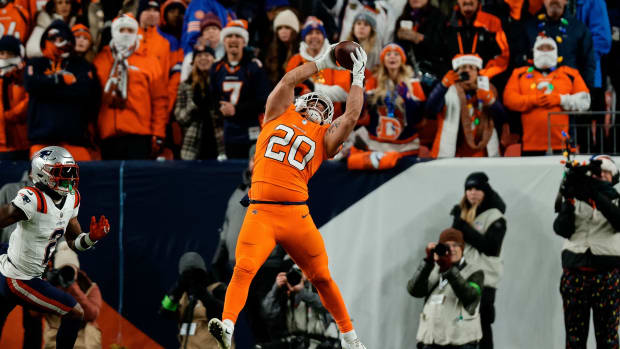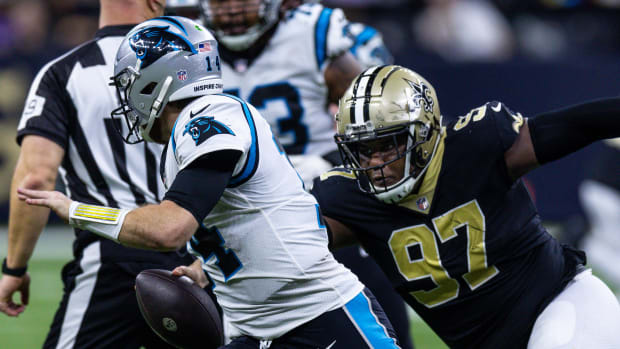Comparing John Elway's Fifth-Year Option Record With NFL GMs Reveals Surprising Takeaway
The Denver Broncos' recent decision to not exercise the fifth-year option for offensive tackle Garett Bolles means that, out of the six first-round picks the Broncos have made since John Elway became general manager in 2011, only two have seen their options picked up and only one — Von Miller — has remained with the team for the long term.
Many would think that's not a good track record to have with first-round picks. However, are the Broncos necessarily worse than the rest of the NFL when it comes to extending the fifth-year option?
As I've said before, a first-round pick is a player who, theoretically, should be a candidate for a second contract, with guys taken earlier in the draft needing to become impact players.
But how has that worked out for most of the NFL? Are most teams keeping their first-round picks around long enough for a second contract? Were they worth that contract?
Or were there factors that kept the team from keeping a player, even if he was talented enough to warrant a new contract? And how many were traded or waived along the way?
I examined what has happened with first-round picks from the years 2011 to 2017 — years in which these classes have all had decisions made on fifth-year options. In the cases of 2011-15, these players have all had decisions made on second contracts by now.
With 2016, decisions for second contracts are still pending in most cases, while decisions on 2017 first-rounders have just begun, even after decisions have been made on fifth-year options.
Let's first look at the overall track record for draft picks in each year, with regards to decisions on options or extensions.
2011: 20 of the 32 first-round picks got their fifth-year options picked up by the teams who drafted them and all but one (Prince Amukamara by the Giants) got a second contract. Eight of these picks' options were declined, with three being waived before the final year of their rookie deals had expired (Aldon Smith by the Niners, Phil Taylor by the Browns, and Derek Sherrod by the Packers).
Meanwhile, three players were traded by the teams who drafted them (Blaine Gabbert by the Jaguars, Jonathan Baldwin by the Chiefs, and Gabe Carimi by the Bears) and one was waived before it came time to make the decision on the fifth-year option (Danny Watkins by the Eagles).
Not all of the players who garnered second contracts finished them out with the teams who drafted them, but overall, the majority of teams found a long-term contributor.
2012: 19 of the 32 first-round picks got their fifth-year options exercised. However, only 10 of those players garnered a second contract from the teams that drafted them. Seven were allowed to depart, one got cut before his fifth-year option kicked in (Robert Griffin III by the Redskins) and one was cut during his fifth season with the team (Michael Floyd by the Cardinals).
Six players had their options declined by the teams who drafted them, but three got extensions while one got waived in his fourth season (Quinton Coples of the Jets). Meanwhile, four first-round picks were traded by the teams who drafted them (Trent Richardson by the Browns, Shea McClellin by the Bears, Chandler Jones by the Patriots, A.J. Jenkins by the Niners) and three were waived early in their deals (Justin Blackmon by the Jaguars, Brandon Weeden by the Browns, and David Wilson by the Giants).
While the talent level of the first round was good, only 13 players stayed with the teams who drafted them, with mixed results in their second contracts.
2013: 17 of the 32 first-round picks got their options exercised, with 10 getting extended by the teams who drafted them. Five weren't retained by those teams, one got the franchise tag but no extension (Ezekiel Ansah by the Lions) and one was traded during his option year (Sheldon Richardson of the Jets).
Meanwhile, 11 first-round picks didn't get their options picked up, with one waived in the final year of his deal (Bjoern Werner by the Colts) and the rest receiving no extension. Two were traded by the teams who drafted them (Barkevious Mingo by the Browns, Jonathan Cooper by the Cardinals), and two were waived early in their careers (Dion Jordan by the Dolphins, Dee Milliner by the Jets). One of the players not extended, Shariff Floyd of the Vikings, had a health issue that unexpectedly ended his career.
Once again, there weren't a lot of teams keeping the first-round picks they drafted for the long term.
2014: 21 of the 32 first-round picks got their options picked up by the teams who drafted them, but only 10 got another contract from those teams. There were two who had options declined, with one who got extended.
One player got cut before the option year kicked in (Eric Ebron by the Lions) and another (Ryan Shazier of the Steelers) suffered a career-ending injury, but he certainly would have been retained if not for that. Yet another (Khalil Mack of the Raiders) was traded after his option was exercised.
Meanwhile, two players got franchise tags, then were traded (Jadeveon Clowney by the Texans and Dee Ford by the Chiefs). Six others were traded before any decision came on the option, while three were waived before it came time to pick up their options (Calvin Pryor by the Jets, Johnny Manziel by the Browns, Dominique Easley by the Patriots).
That means 11-of-32 first-round picks got extended by the teams who drafted them. You may include Shazier if he had stayed healthy, but that's still just 12 first-round picks to be kept by the teams who drafted them.
2015: 16 of the 32 first-round picks got their fifth-year options picked up by the teams who drafted them. Six have been extended, two are under the franchise tag by the teams who drafted them (Brandon Scherff of the Redskins and Bud Dupree of the Steelers), while seven were allowed to leave and one was traded during his option year (Leonard Williams by the Jets).
Meanwhile, six players had their options declined and weren't extended, with one eventually getting waived (Ereck Flowers by the Giants). A record nine first-round picks were traded by the teams who drafted them, while one player was waived early in his career (Breshad Perriman by the Ravens).
The end result is just 8-of-32 first-round picks either got or are in position to get second contracts from the teams who drafted them. The number who got traded distorts the talent of the class, though, because a few players who got traded, such as Amari Cooper, Dante Fowler, Marcus Peters and Laken Tomlinson have become quality players.
Still, if you are expecting a team should find a long-term contributor in the first round, it's not good to see teams dealing away those first-round picks.
2016: 14-of-31 first-round picks (the Patriots forfeited their first-round pick) got their options exercised. Three have been extended, while eight have extensions pending.
However, two were traded after their options were exercised (Jalen Ramsey by the Jaguars and DeForest Buckner by the Niners) and a third was cut before his option kicked in (Leonard Floyd by the Bears).
There were 12 players who got their options declined, with two who were waived in the final year of their deals (Josh Doctson by the Redskins and Robert Nkemdiche by the Cardinals), while one was waived, brought back, then allowed to depart (Laquon Treadwell by the Vikings).
The other eight didn't get extended by the teams who drafted them. Three picks were traded by the teams who drafted them (Eli Apple by the Giants, Laremy Tunsil by the Dolphins and Darron Lee by the Jets) and two were waived early in their careers (Corey Coleman by the Browns and Paxton Lynch by the Broncos).
It remains to be seen how teams will do overall, but less than half of the first-round picks are in line to be extended by the teams who drafted them.
2017: It's easy to wonder what's going on with the Broncos after they declined Bolles' fifth-year option. After all, 17 first-round picks are still with the teams who drafted them and got their options exercised — though one (Christian McCaffrey of the Panthers), got an extension before a decision was made. However, it's clear that McCaffrey would have had the option picked up if he hadn't been extended.
There are 10 first-round picks still with the teams who drafted them who didn't get their options picked up. Time will tell what happens with them, but the same applies to those who did get them picked up. You can probably pick players who you expect to get extended, but for others, it's still up in the air.
There are three players who have been traded by the teams who drafted them (Gareon Conley by the Raiders, Charles Harris by the Dolphins, and Jabrill Peppers by the Browns) and two who were waived early in their careers (Taco Charlton by the Cowboys and Reuben Foster by the Niners).
What it Means
So what's really going on with these first-round picks? A lot of factors come into play that provide context, from a lack of cap space, to players getting big contracts their teams don't want to match, to deciding that other players take priority.
You can see plenty of examples among players who didn't stay with the teams who drafted them. C.J. Mosley was a good player for the Ravens, but they weren't willing to pay him what the Jets offered.
The Patriots don't believe in committing big money to pass rushers, so they traded Chandler Jones. The Chiefs didn't want to prioritize keeping Dontari Poe. There are other examples of good players who teams allowed to depart, simply because they had other ideas in mind about building their teams.
Then there are examples of teams who extended players but didn't keep them for long after extending them. This happened three times with the Rams — they extended Alec Ogletree, only to trade him the next season. L.A. extended Todd Gurley but cut him soon after, and gave a ridiculously high extension to Tavon Austin, only to cut him two seasons later.
There are also teams who have had poor front office situations — the Browns are the most obvious example, because they keep having turnover in the front office — apparently because owner Jimmy Haslam can't make up his mind about what he wants, leading to what seems to change year in and year out.
A Pattern Emerges: Character Concerns
In looking at the players who didn't finish out their deals, you can see one pattern forming — character issues. The list of the players who got waived by the teams who drafted them is replete with those with off-field troubles.
Johnny Manziel, Justin Blackmon, Dion Jordan, Rueben Foster, Taco Charlton and Aldon Smith all are notable for their violations of the substance abuse or personal conduct policies.
There are more examples I could cover, but let's get to the Broncos and examine where the issues were with the five first-round picks who, unlike Von Miller, didn't get either the option picked up or an extension.
Sylvester Williams: He was by no means a bad player — he simply wasn't a priority for the Broncos to retain. Williams worked best as a nose tackle or a 0-tech in a 4-3 scheme and was never the type of player you could move to 3-tech. Perhaps he would have stayed if the Broncos kept a 4-3 scheme after John Fox left, but Williams wasn't somebody who was urgent to extend.
Bradley Roby: Again, Roby was by no means a bad player. The issue with him is that he appears to be the type of player who isn't a 'locker room leader' material. He seems to be better off on a playoff contender, surrounded by players who are known for keeping a good environment in the locker room. Had the Broncos remained a playoff contender (we'll get to a big reason why they didn't), Roby might still be here.
Shane Ray: His stock dropped after he was cited for marijuana possession just days before the draft. To his credit, he never had a violation of NFL policies while playing for the Broncos. However, injuries kept him off the field, then he fell out of favor with the coaching staff in his final season. There were reports about his attitude being an issue, which didn't help his cause.
Paxton Lynch: We know the story here — Lynch never put the time in to become a better quarterback. His failure to develop is a big reason why the Broncos have missed the playoffs for multiple seasons.
Garett Bolles: A polarizing player, for sure, and he does have some talent, but penalties and inconsistency have been issues for him. There's a chance he could get an extension if he breaks out, but only time will tell.
Elway Not as Bad as the Tropes Imply
If you look at some of the players Elway has drafted in the first round, they're the types who didn't become locker room leaders. That's definitely the case with Roby, Ray, and Lynch.
And Elway has spoken publicly about his shift to focusing on character as much as he focuses on talent when selecting players. The likes of Bradley Chubb, Noah Fant and Jerry Juedy are players who had the respect of the locker room in college, along with having plenty of talent. If this trio can sustain a good attitude, it will do as much to help the Broncos as whatever talent they bring to the field.
Certainly, Elway needed to improve his draft approach, but when it comes to the first round, he's not the only GM declining fifth-year options or extending first-round picks.
With just 69-of-160 first-round picks from 2011-15 getting extended by the teams who drafted them, that's less than half of those first-rounders sticking around long term. And in some cases, you could debate whether or not the team in question should have extended him.
It's easy to look at 2017's first-round draft class and think every team has players guaranteed to be around for the long term, but the truth is, the majority of first-rounders aren't staying with the teams who drafted them and there are plenty of bonafide busts to go around.
While Elway can do better in finding long-term contributors, he's really 'par for the course' when it comes to finding those players in the first round.
Follow Bob on Twitter @BobMorrisSports and @MileHighHuddle.
